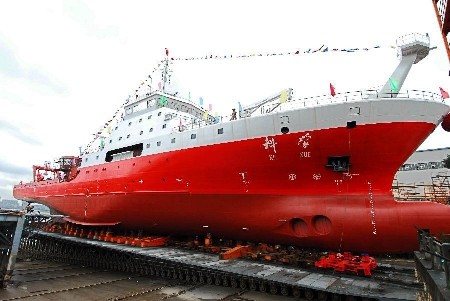After lifting its three-year ban on huge iron-ore carriers, China has opened on Thursday four of its ports and welcomed a huge megaship, designed by Brazilian mining company Vale, which docked at East China's Qingdao Port over the weekend.
The recent docking signifies that China's bulk shipping industry has finally seen the dawn of megaship era.
The Vale-designed carrier named Yuan Zhou Hai is a 400,000-ton vessel purchased by the joint venture of China's leading shipping companies China COSCO Bulk Co. and China Shipping Development Co.
The ship is part of the deal signed by the venture and Vale earlier in May, where the two agreed that the former will be buying four huge iron-ore carriers from the latter.
It was the first time that a dry-bulk vessel was be permitted to anchor at a Chinese port since the ban was imposed in 2012. Currently, four ports are now allowed to welcome such carriers, namely Shandong Province's Qiangdao Port, Lioaning Province's Dalian Port, Hebei Province's Tangshan Port, and Zhejiang Province's Ningbo Port.
The lifting of the ban is aimed at letting the country join the megaship trend, according to a joint statement released by the Ministry of Transport and the National Development and Reform Commission.
"[The] use of megaships has already become an industry trend, which can help shipping companies reduce operating costs," analyst Wu Minghua stated.
"Generally speaking, a vessel with the capacity of 400,000 tons or above can help cut operating costs by 15 percent to 20 percent," Wu added, emphasizing however that economies of scale will not be immediately felt by the industry citing other issues such as low shipping rates and weak local market demand.
China, regarded as the world's leading iron ore buyer, imported a total of 70.87 million tons in May, a year-on-year decrease of 8.41 percent, according to the General Administration of Customs.



























